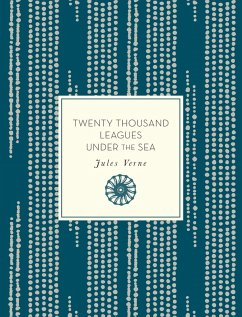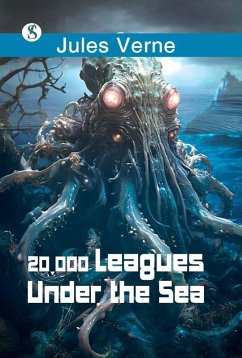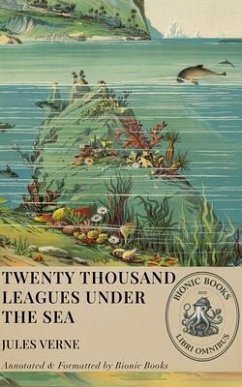
Twenty Thousand Leagues under the Sea - The Original Classic Edition (eBook, ePUB)

PAYBACK Punkte
2 °P sammeln!
The plot is familiar: Captain Nemo, an enigmatic figure who has withdrawn himself from the world, tours the oceans in his submarine called the Nautilus. We see this journey of 20,000 leagues (approx. 43,200 miles) through the eyes of Professor Pierre Aronnax, a scientist who is both Nemos guest and prisoner. Also aboard with Aronnax are his manservant Conseil and a gruff ships harpooner, Ned Land. The Nautilus encounters many wonders and obstacles on its long voyage: underwater forests, giant clams, attacks by huge squid, imprisonment in ice at the South Pole, monster storms, a war with a pack...
The plot is familiar: Captain Nemo, an enigmatic figure who has withdrawn himself from the world, tours the oceans in his submarine called the Nautilus. We see this journey of 20,000 leagues (approx. 43,200 miles) through the eyes of Professor Pierre Aronnax, a scientist who is both Nemos guest and prisoner. Also aboard with Aronnax are his manservant Conseil and a gruff ships harpooner, Ned Land. The Nautilus encounters many wonders and obstacles on its long voyage: underwater forests, giant clams, attacks by huge squid, imprisonment in ice at the South Pole, monster storms, a war with a pack of sperm whales, and the discovery of the lost continent of Atlantis. But as something deep and destructive gnaws away at Captain Nemo, his prisoners seek a way to escape from the miracle ship.
In the English-speaking world Jules Verne has rarely received in the praise he truly deserves as a writer. People applaud his scientific foresight (while criticizing him for errors that were usually the fault of the translators), but shrug off his writing as inconsequential, with cardboard characters and plotless stories. If only these critics would read this translation of Vernes best novel...they would have to re-think their position on the great French writer! His genius for blending adventure, comedy, and psychology burst through in this translation. The book does veer into lengthy descriptions of marine life in places, and modern readers are likely to skim these parts (Verne even provides clues in the text to indicate when hes about to digress), but as a whole the novel is absolutely engrossing, throwing one stupendous adventure after another at the characters, while developing a mystery around Captain Nemo and increasing tension onboard the Nautilus so that the many different incidents hold together as a single plot. Even though submarines are commonplace technology today, Verne infuses his story with such awe-inspiring wonder that you cant help but feel the same sense of amazement as Professor Aronnax when he finds himself cruising the depths of the worlds oceans. Real wonder never gets stakes, and no one was better at creating wonder than Jules Verne.
There really isnt any other choice when it comes to translations of the 20,000 Leagues under the Sea. Nothing comes close to this: it will appease hard science readers, and it will open people up to Jules Vernes overlooked literary talents. With the wealth of background information available, this edition does better by Jules Verne -- ANY Jules Verne -- than has ever been published in the English language.
In the English-speaking world Jules Verne has rarely received in the praise he truly deserves as a writer. People applaud his scientific foresight (while criticizing him for errors that were usually the fault of the translators), but shrug off his writing as inconsequential, with cardboard characters and plotless stories. If only these critics would read this translation of Vernes best novel...they would have to re-think their position on the great French writer! His genius for blending adventure, comedy, and psychology burst through in this translation. The book does veer into lengthy descriptions of marine life in places, and modern readers are likely to skim these parts (Verne even provides clues in the text to indicate when hes about to digress), but as a whole the novel is absolutely engrossing, throwing one stupendous adventure after another at the characters, while developing a mystery around Captain Nemo and increasing tension onboard the Nautilus so that the many different incidents hold together as a single plot. Even though submarines are commonplace technology today, Verne infuses his story with such awe-inspiring wonder that you cant help but feel the same sense of amazement as Professor Aronnax when he finds himself cruising the depths of the worlds oceans. Real wonder never gets stakes, and no one was better at creating wonder than Jules Verne.
There really isnt any other choice when it comes to translations of the 20,000 Leagues under the Sea. Nothing comes close to this: it will appease hard science readers, and it will open people up to Jules Vernes overlooked literary talents. With the wealth of background information available, this edition does better by Jules Verne -- ANY Jules Verne -- than has ever been published in the English language.
Dieser Download kann aus rechtlichen Gründen nur mit Rechnungsadresse in A, D ausgeliefert werden.













